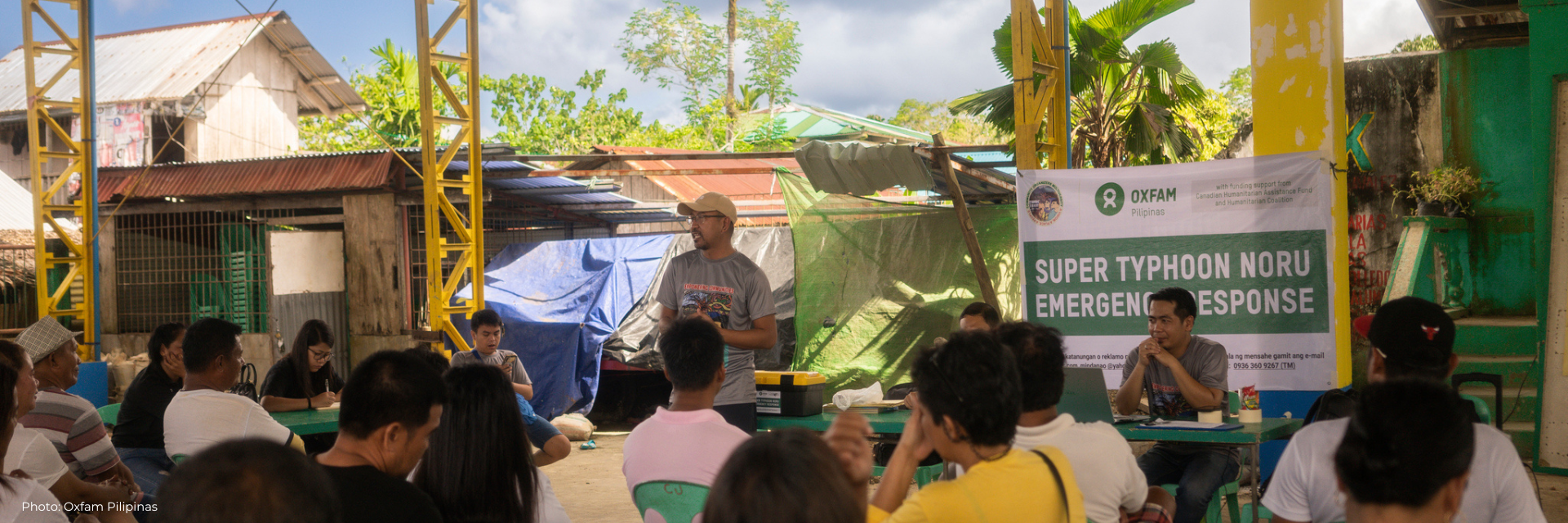
Villaruel's Vision for Humanitarian Aid
After Super Typhoon Noru swept through parts of Luzon in The Philippines in September 2022, Villaruel Evhoy sprang into action.
Villaruel, 47, is a project coordinator with Community Organizers Multiversity (COM), a non-government organization in The Philippines. Established 20 years ago primarily to respond to the humanitarian crises in areas in the region, it has extensive experience in providing humanitarian assistance in difficult-to-reach areas--something that makes it a great partner for Humanitarian Coalition member Oxfam Canada, working with its affiliate in The Philippines, Oxfam Pilipinas.
With winds of over 195 KMH, the typhoon affected an estimated 108,000 families, with over a quarter of them living below the poverty line.
After it hit, Villaruel helped lead the rapid assessment team to determine the extent of the damage and the impact on the lives of residents affected and to distribute assistance.
The most successful projects, he said, "are the ones that the residents of the communities
own. Owned in the sense that the residents see themselves as more than just recipients of aid but as partners in maintaining and managing the project to ensure its success and sustainability."
This includes emergency responses, like after the typhoon, he said.
To make sure this was the case, the team listened to and documented findings from the residents, then involved them in planning the response.
"We came up with the plans for the water system repairs only after gathering documentation," he said. "We wanted to make sure that the assistance we would be providing would genuinely be useful to people, that the service we were to give is needed."
Villaruel is also grateful for Oxfam and the Humanitarian Coalition.
"The work we do is always beneficial to so many Filipinos," he said of the help COM receives from Canada--and how it leads to additional positive results.
"Humanitarian aid is only meant to be temporary, but we have seen in our visits to many communities that it is also important that humanitarian organizations and support groups make an effort to at least strive for a little sustainability when it comes to assistance we give," he said.
That sustainability is achieved through learning discussions and training sessions for affected communities, he said, adding the goal is to ensure the residents are empowered to ensure useful change in their communities and help build local resilience.
In the case of Super Typhoon Noru, that meant teaching people how to purify water for emergencies using water purification tablets dissolved in streams or tap water stored in sanitized canisters. They were also taught how to maintain water pipes and tap stands.
"Humanitarian and development work are not separate," said Villaruel. "Calamities damage lives and livelihoods, and people need immediate help, so the response must also be swift. We should always cultivate and practice both."
After Super Typhoon Noru swept through parts of Luzon in The Philippines in September 2022, Villaruel Evhoy sprang into action.
Villaruel, 47, is a project coordinator with Community Organizers Multiversity (COM), a non-government organization in The Philippines. Established 20 years ago primarily to respond to the humanitarian crises in areas in the region, it has extensive experience in providing humanitarian assistance in difficult-to-reach areas--something that makes it a great partner for Humanitarian Coalition member Oxfam Canada, working with its affiliate in The Philippines, Oxfam Pilipinas.
With winds of over 195 KMH, the typhoon affected an estimated 108,000 families, with over a quarter of them living below the poverty line.
After it hit, Villaruel helped lead the rapid assessment team to determine the extent of the damage and the impact on the lives of residents affected and to distribute assistance.
The most successful projects, he said, "are the ones that the residents of the communities
own. Owned in the sense that the residents see themselves as more than just recipients of aid but as partners in maintaining and managing the project to ensure its success and sustainability."
This includes emergency responses, like after the typhoon, he said.
To make sure this was the case, the team listened to and documented findings from the residents, then involved them in planning the response.
"We came up with the plans for the water system repairs only after gathering documentation," he said. "We wanted to make sure that the assistance we would be providing would genuinely be useful to people, that the service we were to give is needed."
Villaruel is also grateful for Oxfam and the Humanitarian Coalition.
"The work we do is always beneficial to so many Filipinos," he said of the help COM receives from Canada--and how it leads to additional positive results.
"Humanitarian aid is only meant to be temporary, but we have seen in our visits to many communities that it is also important that humanitarian organizations and support groups make an effort to at least strive for a little sustainability when it comes to assistance we give," he said.
That sustainability is achieved through learning discussions and training sessions for affected communities, he said, adding the goal is to ensure the residents are empowered to ensure useful change in their communities and help build local resilience.
In the case of Super Typhoon Noru, that meant teaching people how to purify water for emergencies using water purification tablets dissolved in streams or tap water stored in sanitized canisters. They were also taught how to maintain water pipes and tap stands.
"Humanitarian and development work are not separate," said Villaruel. "Calamities damage lives and livelihoods, and people need immediate help, so the response must also be swift. We should always cultivate and practice both."